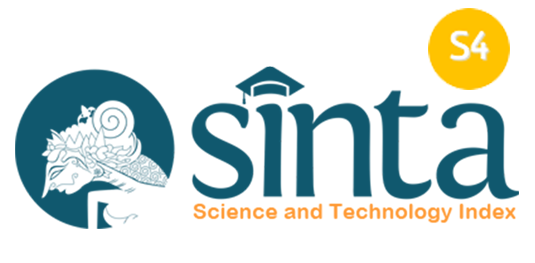PENERAPAN METODE PROJECT WORK DALAM PEMBELAJARAN PRAKTIK UNTUK MENINGKATKAN KOMPETENSI PRAKTIK BODY OTOMOTIF PADA MAHASISWA PENDIDIKAN TEKNIK MESIN FKIP UNS TA 2012/2013
Abstract
This reseach aims to study how to improve the student competence by implementation of project work learning method . Specifically this research aims to study the percentage of mastery learning on automotive body practice lecture .
This research used PTK ( Classroom Action Research ) and was performed two cycles . The research was conducted in the Mechanical Engineering Department at PTK UNS PTK with 7th semester students . And the student took a course automotive body practice. The number of the student was 34 person. Data was collected by a test or tests of competence . Analysis of the data used descriptive qualitative analysis
The results shows that student competence’s increase in automotive body practice learning. From two cycles , there has been an increase in from 72.85 to be 77.24 . In the second cycle to 70.01 . While the percentage of students who have not passed are also increasing . From 11.8 % to 2.9 % . In the second cycle of 0% .
Full Text:
PDFReferences
Anas Sudijono. (2005). Pengantar Evaluasi Pendidikan. Jakarta: Raja Grafindo Persada
Buedewick, I. (2003). Aspect of Methodology and Education Psychology in Project-Oriented Studies. Makalah disajikan dalam International Workshop on Project Oriented Learning di Hanzehogeschool Groningen, Fakulty of Technology
Depdiknas (2007) Petunjuk Teknis Penyelenggaraan Uji Kompetensi Keahlian Sekolah Menengah Kejuruan. Jakarta
Farida Yusuf Tayipnapis. (1989). Evaluasi Program. Jakarta: Proyek Pengembangan LPTK.Dirjen Dikti. Depdikbud.
Fernandes, HJX. (1984).Evaluation of Educational Programs. Jakarta: National Education Planning Evaluation ang Curriculum Development
Mergendoller, J.R., & Thomas, J.W. (2000). Managing Project Based Learning: Principles from the Field. Novato, CA: Buck Institute for Education.
Michael M Grant; Robert Maribe Branch. (2005). Project-Based Learning In a Middle School: Tracing Abilities Through The Artifact Learning [versi elektronik]. Journal of Research on Technology in Education, 38,1, 65-98
Moti Frank & Abigail Barzilai.(2006). Project-Based Technology: Instructional Strategyfor Developing Technological Literacy [versi elektronik]. Journal of Technology Education, Vol. 18 No. 1,39-53.
Railsback, J. (2002). Project Based Instruction: Creating Excitement for Learning. Portland, Oregon: Northwest Regional Educational Laboratory
Richard, N. Savage, Chen, K & Vanasupa, L. (2007). Integrating Project-based Learning throughout the Undergraduate Engineering Curriculum [versi elektronik]. Journal of STEM Education, Vol 8, 15-27
Stufflebeam, DL, & Shinkfield, AJ. (1985). Systematic Evaluation. Massachusetts:Kluwer-Nijhoff Publishing
Suharsimi Arikunto & Cepi Safrudin AJ. (2004). Evaluasi Program Pendidika,Panduan Teoritis Praktis bagi Praktisi Pendidikan. Jakarta:BPT Bumi Aksara
Suharsimi Arikunto. (1988). Penilaian program pendidikan. Jakarta:PT Bina Aksara
Thomas, J.W. (2000). A Review od Research on Project-Based Learning. California: The Autodesk Foundation. Available on: http://www.autodesk.com/foundation.
Tippet, R & Amoros, A. (2003). The Project Method in Vocational Training. Mannheim: InWent
Waras Kamdi. (2001). Section 1-Pengantar. Pembelajaran Berbasis Proyek: Model Potensial untuk Peningkatan Mutu Pembelajaran. Diambil tanggal 16 September 2008 dari http://waraskamdi.com/content/view/55/16/
Waras Kamdi. (2001). Section 2-Mengapa Pembelajaran Berbasis Proyek. Pembelajaran Berbasis Proyek: Model Potensial untuk Peningkatan Mutu Pembelajaran. Diambil tanggal 16 September 2008 dari http://waraskamdi.com/content/view/54/16/
Waras Kamdi. (2001). Section 3-Dukungan Teoritik Pembelajaran Berbasis Proyek. Pembelajaran Berbasis Proyek: Model Potensial untuk Peningkatan Mutu Pembelajaran. Diambil tanggal 16 September 2008 dari http://waraskamdi.com/content/view/52/16/
Waras Kamdi. (2001). Section 3-Konsep dan Karakteristik Belajar Berbasis Proyek. Pembelajaran Berbasis Proyek: Model Potensial untuk Peningkatan Mutu Pembelajaran. Diambil tanggal 16 September 2008 dari http://waraskamdi.com/content/view/53/16/
Waras Kamdi. (2001). Section 4-Keuntungan Belajar Berbasis Proyek. Pembelajaran Berbasis Proyek: Model Potensial untuk Peningkatan Mutu Pembelajaran. Diambil tanggal 16 September 2008 dari http://waraskamdi.com/content/view/51/16/
Weiss, CH. (1972).Evaluation research methods for assessing program effectiveness.Englewood Cliffs:Prentice Hall,Inc.
Worthern, BR & Sanders, JR. (1973) Educational Evaluation: theory and practice.Belmont,California. Wadsworth Publishing Company
DOI: https://doi.org/10.20961/jiptek.v6i1.12506
Refbacks
- There are currently no refbacks.
Copyright (c) 2013 Basori Basori

This work is licensed under a Creative Commons Attribution 4.0 International License.






